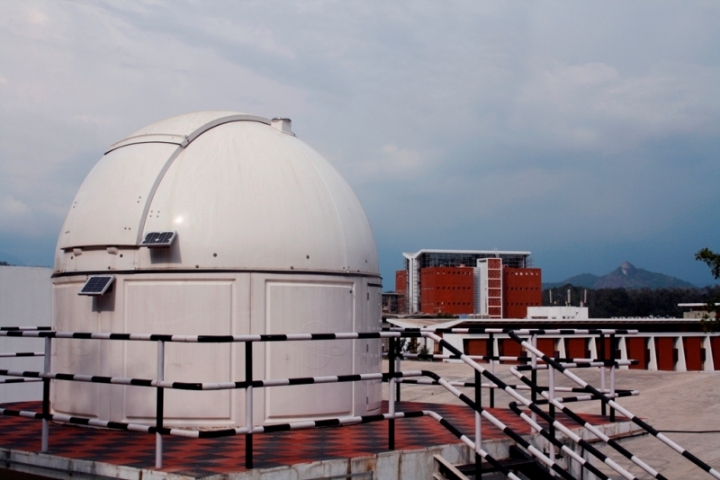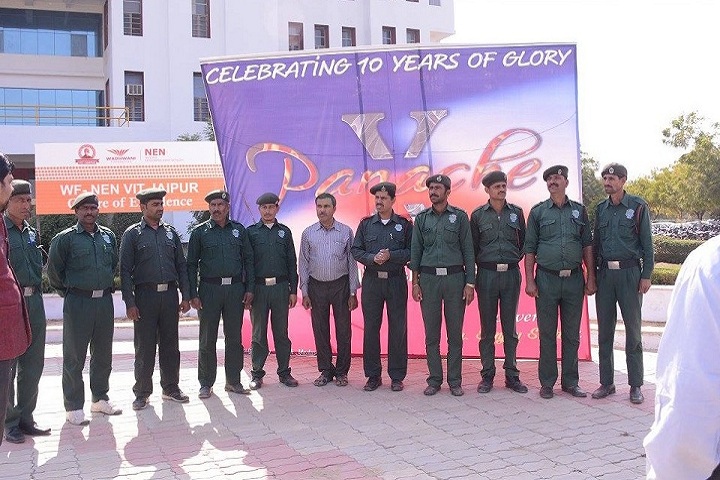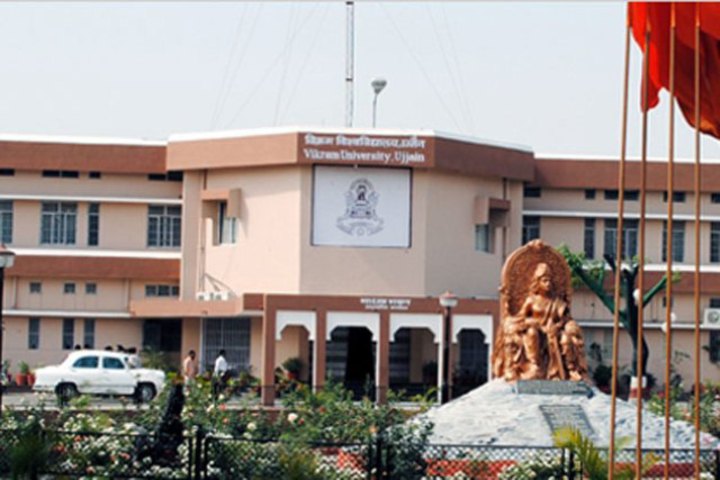
Astrophysics Course Details - Fees, Subjects, Syllabus, Duration, Eligibility, Career Scope
Degrees offered: B.Sc.(Hons), BS, Ph.D, B.Sc., M.Sc.
What is Astrophysics
Astrophysics is the branch of astronomy that deals with the physics of celestial objects and phenomena. This subject involves the application of the laws of science to explain the birth of the universe, and the death of planets, stars, nebulae, galaxies, and other celestial objects. It aims to understand the universe's origins, structure, and evolution through the application of physics and chemistry principles.
Astrophysics derives from or is similar to, two other branches of science which deal with space, cosmology and astronomy. Astrophysicists study the universe and seek to understand how it functions and what role we play in it. NASA, the largest organisation for space research, employs astrophysicists who discover the evolution and beginning of the universe, its workings, and the presence of life on other planets and stars.
Graduates of Astrophysics are offered job opportunities in profiles like Astrophysicist, Stellar Astronomer, Observational Astronomer, Lecturer. These profiles are offered in Nainital Indian Institute of Astrophysics (IIA), Bangalore Indian Space Research Organization (ISRO), Aryabhatta Research Institute of Observational Sciences (ARIES), for an average package of Rs. 9 LPA.
Highlights- Astrophysics
Particulars | Values |
Branch Name | Astrophysics |
Degree | B.A., B.Sc., B.Sc.(Hons), BS, M.Phil., M.S, M.Sc. |
Duration | UG: 3 years PG: 2 years |
Eligibility | UG: Completion of 10+2 in any stream PG: Graduation in any field with a minimum 50 per cent aggregate. |
Admission Process | Admission Examination and Merit Scores |
Entrance Exam | UG: IISER, SAAT PG: CPGET, AUCET |
Course Fees | Rs. 18,000 - Rs. 2 lakhs |
Job Profiles | Astrophysicist, Stellar Astronomer, Observational Astronomer, Lecturer |
Average Salary | Rs. 9 LPA |
Recruiting Companies | Nainital Indian Institute of Astrophysics (IIA), Bangalore Indian Space Research Organization (ISRO), Aryabhatta Research Institute of Observational Sciences (ARIES), National Centre for Radio Astrophysics, TIFR, Pune, Inter-University Centre for Astronomy and Astrophysics, Pune |
Specialisation or Similar Ones
Astrophysics is a broad discipline in science. It includes similar or related specialisations. Candidates can choose the specialisations based on their interests and future goals. Some of the popular specialisations offered in the field of Astrophysics are mentioned in the table below.
Cosmology | Galactic Astronomy |
Astrobiology | Radio Astronomy |
Planetary Science | Theoretical Astrophysics |
Top Astrophysics Colleges in India with Fees
Many science institutes in India offer Astrophysics courses at affordable tuition fees. These colleges are highly reputed and provide good placement opportunities to graduates in the field of Astrophysics. Prior academic achievements and admission test scores are used to determine admission into the programme. Astrophysics is offered by several of India's top institutions.
Colleges | Fee Structure |
- | |
- | |
- | |
Rs. 23,900 | |
Rs. 1.8 Lakhs | |
Rs. 18,800 | |
- |
Top Government Astrophysics Colleges in India with Fees
Many top Government colleges in India provide Astrophysics courses. Attending a government engineering college is less expensive than attending a private college. These colleges are well known for their high academic standards and affordable fees throughout India. The following are some of the best government colleges that provide Astrophysics courses:
Colleges | Fee Structure |
DU Delhi | - |
IIST Thiruvananthapuram | - |
Presidency University, Kolkata | - |
Central University of Haryana, Mahendergarh | Rs. 23,900 |
Vikram University, Ujjain | Rs. 18,800 |
Mother Teresa Women's University, Kodaikanal | - |
Eligibility Criteria (UG & PG) of Astrophysics
Those interested in pursuing a course or a degree in Astrophysics need to fulfil the eligibility details required by the colleges. For undergraduate degrees, students generally need to complete their 10+2. For PG degrees, they require a Bachelor’s degree in similar or related disciplines. The eligibility details for Astrophysics courses are mentioned below.
Eligibility Criteria for UG Courses
Candidates who wish to pursue Astrophysics at an undergraduate level must satisfy certain eligibility criteria. Some of the most common eligibility conditions to get admission into the course are listed below:
- Candidates must have completed 10+2 in any stream but Mathematics and Physics are compulsory subjects.
- Aspirants must have completed their 10+2 with a minimum of 50 per cent marks.
- No age limit has been prescribed for admission into Astrophysics.
- Students may have to appear for entrance examinations if prescribed by their respective colleges.
Top Entrance Exams for UG Courses
Aspiring candidates need to appear for certain entrance examinations before applying for admission. Some colleges may conduct university-specific examinations for Astrophysics courses. In the table below, we have provided the details of a popular examination for UG degrees.
Exam Name | Level | Conducting Body | Exam Schedule |
National | The Indian Institutes of Science Education and Research | - | |
National | Siksha O Anusandhan University | - |
Eligibility Criteria for PG Courses
Students who have completed their undergraduate in Astrophysics can further pursue their post-graduation in the same field. Aspirants must fulfil the eligibility requirements listed below:
- Students applying for postgraduate degrees in Astrophysics must hold a bachelor’s degree in the science stream.
- They must have completed their degrees with at least 55 per cent from a recognised institute in India.
- Aspirants may have to take PG Entrance exams as conducted by academic institutes.
Top Entrance Exams for PG Courses
Candidates who aspire to pursue their post-graduation must appear for certain entrance examinations. Students are required to clear the cutoff of these high-level tests to get admitted into a college of their choice. Some of the examinations are as follows.
Exam Name | Level | Conducting Body | Exam Schedule |
State | Osmania University | ||
State | Andhra University | - |
Scope of Astrophysics in India and Abroad
A significant development in the field of Astrophysics has come about with the increasing execution of spacecraft missions which map celestial bodies and produce their close-up images. As a result, there has been a surge in employment opportunities in the field. A fresh graduate in the field is usually introduced into a research team with a project already underway.
A lot of Astrophysics professionals receive employment opportunities from the federal government or in observatories and laboratories supported federally. Additionally, many consulting firms provide professionals to the government for fulfilling certain requirements or performing certain tasks. In India, lucrative opportunities can be found in major establishments like the Indian Space Research Organisation (ISRO), Space Physics Laboratories, Vikram Sarabhai Space Centre (VSSC) or the Association of Bangalore Amateur Astronomers.
Astrophysics offers significant scope both in India and abroad, with opportunities in research institutions, space agencies, and universities, focusing on exploring the universe's mysteries. The scope, however, is more varied and plentiful abroad in organisations such as the Niels Bohr Institute, Naval Research Laboratory, Space Telescope Science Institute, and most importantly, the National Aeronautics and Space Administration (NASA).
Course Fees Astrophysics
| Minimum Fees | Maximum Fees | |||
|---|---|---|---|---|
| Private | Government | Private | Government | |
| UG | ||||
| PG | ||||
Course Subjects
The syllabus for Astrophysics may vary depending on the level of the programme. The syllabus may also vary depending on the institution. The curriculum equips students with the necessary knowledge and practical exposure. The curriculum provides a holistic growth potential to students that helps them to further excel in their careers.
Astrophysics Syllabus for UG Courses
The Astrophysics courses are available in different undergraduate degrees and the duration of these courses is generally three years. The curriculum of these degrees provides the students with ample theoretical and practical learning. In the table below we have mentioned some of the important topics that are covered in the undergraduate in Astrophysics:
Properties of Matter | Special Relativity |
Oscillation of waves | Physics of field and matter |
Astrophysics | Modern Physics |
Practical Physics | Thermal Physics |
Quantum Mechanics | Classical Mechanics |
Linear Algebra and Calculus | Cosmology |
Nuclear and Particle Physics | Thermodynamics |
Statistics Physics | Galaxies |
Dynamics and Relativity | Research Methodology |
Positional Astronomy | Stellar Atmosphere |
Celestial and Fluid Mechanics | Space Physics |
Electromagnetic Waves and Radiating Systems | Astronomical Techniques |
Plasma Physics | Lasers and Applications |
Astrophysics Syllabus for PG Courses
The academic curriculum of PG courses in Astrophysics equips students with the necessary knowledge and skills required to excel in the field. The syllabus covers a range of topics. In the table below we have provided the syllabus of Indian Institute of Space Science and Technology for their MS Astrophysics course.
First Semester | Second Semester |
Introduction to Astronomy and Astrophysics | Structure and Evolution of Stars |
Astronomical Techniques | Galaxies (Structure, Dynamics and Evolution) |
Radiation Processes in Astrophysics | Cosmology |
Computational Astrophysics | Elective I |
Planetary Sciences | Seminar |
Data Analysis Astronomy Lab | Observational Astronomy Lab |
Third Semester | Fourth Semester |
Self-study elective with seminar | Thesis Phase II |
Thesis Phase I | - |
Careers in Astrophysics
Accomplished graduates in Astrophysics receive plenty of employment opportunities from institutes and organisations which are involved in research, theoretical work, and teaching in Astrophysics both in India and abroad. They typically get hired as Research Scientists with institutions that fund research and are provided with grants to pursue research work in the field of their interest.
A career in Astrophysics can be rewarding for those who are genuinely curious about the universe and the secrets that its vast expanses of unexplored regions hold. Astrophysicists receive plenty of support to actively pursue the observation of new planets, their stars, and galaxies, and upon making new findings can even receive awards, considering that their discovery has helped further our understanding of the universe.
Job Profiles | Job Descriptions |
Astrophysicists utilise telescopes positioned in space and ashore to observe celestial bodies; gauging radio, X-beam and infrared signals from extraterrestrial sources. They conduct research, analyse data, and develop theories to understand the cosmos's origins, structure, and evolution. | |
Stellar Astronomers study the stars; their work can take place in many specialised areas. Solar astronomers study the Sun, which is the nearest star to the Earth, cosmologists study the history of the universe, and planetary astronomers study the compositions of planets. | |
Observational Astronomer | Observational Astronomers specialise in certain kinds of celestial bodies or events in the universe, like black holes; development and testing of scientific theories. They write research proposals; analyse relevant data; and compose scientific papers to present their findings. |
Lecturers work with colleagues of the department on building or modifying the course curriculum; and study the advancement of areas within the Astrophysics discipline. They deliver lectures over various modules in an established programme and carry out activities in support of departmental academic work. |
Upcoming trends
Astrophysics and Astronomy are volatile areas of research with discoveries being unearthed now and then. Our very understanding of the universe today has stemmed from Astrophysical and Astronomical discoveries, and it continues to develop as more studies and extensive research continue to reveal more about the universe. Some of the latest hot topics in Astrophysics include:
- Gravitational Wave Astronomy
- Exoplanet Research
- Dark Matter and Dark Energy
- Multi-Messenger Astronomy
- Artificial Intelligence and Machine Learning
Job Profiles and Top Recruiters
Astrophysics provides a diverse range of career opportunities for those who have an ardent interest in space exploration. Professors and lecturers, who train the next generation of astrophysicists, research scientists, who carry out theoretical and observational studies, and data analysts, who decipher astronomical data, are important jobs. Jobs in planetariums, space agencies, and scientific outreach initiatives offer a variety of ways to advance our knowledge of space.
Top Recruiters:
- Nainital Indian Institute of Astrophysics (IIA)
- Bangalore Indian Space Research Organization (ISRO)
- Aryabhatta Research Institute of Observational Sciences (ARIES)
- National Centre for Radio Astrophysics
- TIFR, Pune
- Inter-University Centre for Astronomy and Astrophysics, Pune
Average Salary
Candidates in the field of Astrophysics are offered lucrative benefits and high salary packages. While salaries may vary depending on the job role, responsibilities, research area and experience, the average salaries for each job profile can be estimated as Rs. 9 LPA. Some of the high-paying job profiles are:
Job Profiles | Average Expected Salary |
Astrophysicist | Rs. 9 LPA |
Stellar Astronomer | Rs. 8.5 LPA |
Observational Astronomer | Rs. 6 LPA |
Lecturer | Rs. 11 LPA |
Source: Ambition Box
The salary figures mentioned anywhere in these articles are just for reference purposes. Please treat them as such. Actual salaries may vary depending on respective candidates, employer, job location, and numerous other factors.
Required Skillset for Astrophysics
Astrophysics is a field that requires a lot of dedication and hard work. It is one of the highest-paid careers in science. Students who wish to enter the field must possess a combination of various skills and qualities that will help them to excel in their careers. Mentioned below are some of the important attributes and skills required for the Astrophysics field.
- A solid grasp of Mathematics and Science concepts
- Critical thinking
- Decision-making and Judgement
- Complex problem solving
- Financial resources management
- Systems analysis and evaluation
Course Curriculum for Astrophysics
A course in Astrophysics is designed to equip students with an in-depth understanding of the universe and its elements, celestial objects and their properties, as well as the Earth. Students are trained in very basic research methods because a career in Astrophysics is typically largely research-oriented. The course trains them in observation techniques, as well as different methods of arriving at solutions to certain problems.
- Exploration of the composition of the universe,
- Revelation of the truths and dispelling the myths about the universe,
- Development of new techniques for observation to better understand the solar system.
Popular Astrophysics Entrance Exams in India
Frequently Asked Questions (FAQs)
Question: What is the difference between Astronomy and Astrophysics?
Answer :
Astronomy is the science which deals with the study of celestial bodies like planets, stars, comets, nebulae, galaxies, and star clusters. Astrophysics is a branch of Astronomy which is concerned with the physics of the universe including the physical properties, interactions, and behaviour of celestial objects.
Question: What is the difference between Cosmology and Astrophysics?
Answer :
Astrophysics is a branch of study concerned with the physics of the universe including the physical properties, interactions, and behaviour of celestial objects. On the other hand, Cosmology is a branch of study that pertains to the universe as a whole and the largest scales of its phenomena. Certain events like the Big Bang are cosmological areas of study.
Question: Can I pursue an M.Sc. in Astrophysics after a BE?
Answer :
The eligibility criteria for M.Sc. Astrophysics can differ from university to university. Depending on the colleges to which you wish to apply, the required subject combination as a prerequisite may differ. Some may allow a BE degree.
Question: Is Astrophysics difficult?
Answer :
Many sub-specialities fall under Astrophysics. While certain disciplines may be difficult for some, others may pique their interest more. One will require a fairly thorough understanding of fluid dynamics and nuclear physics. Astrophysics is not difficult if one can find the discipline that suits their interest and knowledge best.
Question: Is Astrophysics a good career?
Answer :
Unlike astronomers who are primarily concerned with the experimental side of science, astrophysicists lean towards theory and advanced mathematics. A career in this field, therefore, is very lucrative and rewarding and can lead to enormous recognition in Astrophysics.





























